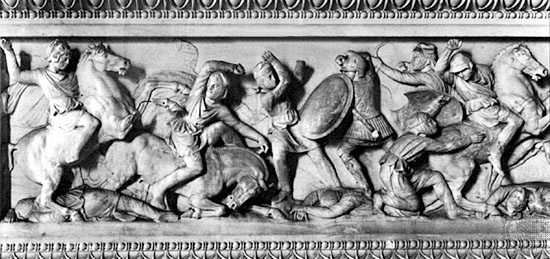Hamdi Bey, Osman
Turkish statesman
born 1842, Constantinople, Ottoman Empire 【now Istanbul, Tur.】
died Feb. 23, 1910, Constantinople
Turkish statesman and art expert who asserted the right of Constantinople to receive the finds made by various archaeological enterprises in the Ottoman Empire.
 Hamdi Bey founded the Archaeological Museum of Istanbul and became its director in 1881. His enlightened taste and energy did much to establish the reputation of the museum and its impressive collection of Greco-Roman antiquities. Included among the treasures that he secured for the museum are the famous Greek sarcophagi found in the royal necropolis at Sidon (now in Lebanon) in 1887. These are outstanding examples of Greek art of the 5th and 4th centuries BC, and they are in perfect preservation. The magnificent “Alexander” sarcophagus (so named because it was originally believed to be that of Alexander the Great; see photograph-->
Hamdi Bey founded the Archaeological Museum of Istanbul and became its director in 1881. His enlightened taste and energy did much to establish the reputation of the museum and its impressive collection of Greco-Roman antiquities. Included among the treasures that he secured for the museum are the famous Greek sarcophagi found in the royal necropolis at Sidon (now in Lebanon) in 1887. These are outstanding examples of Greek art of the 5th and 4th centuries BC, and they are in perfect preservation. The magnificent “Alexander” sarcophagus (so named because it was originally believed to be that of Alexander the Great; see photograph--> ) even retains traces of its original colouring. Hamdi Bey's account of the excavation, Une nécropole royale à Sidon (“A Royal Necropolis at Sidon”), cowritten by Théodore Reinach, was published in 1892.
) even retains traces of its original colouring. Hamdi Bey's account of the excavation, Une nécropole royale à Sidon (“A Royal Necropolis at Sidon”), cowritten by Théodore Reinach, was published in 1892. - Elimelech Of Lizhensk
- elimination reaction
- Elinor Glyn
- Elinor Wylie
- Elion, Gertrude B.
- Elio Petri
- Eliot, Charles William
- Eliot Feld
- Eliot, George
- Eliot, Jared
- Eliot, John
- Eliot Ness
- Eliot Porter
- Eliot, Sir Charles
- Eliot, Sir John
- Eliot Spitzer
- Eliot, T.S.
- Elio Vittorini
- Eliphalet Remington
- Eliphaz The Temanite
- Elis
- Elisabeth Antoinette Irwin
- Elisabeth Bergner
- Elisabeth Domitien
- Elisabeth Förster-Nietzsche